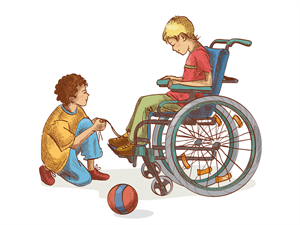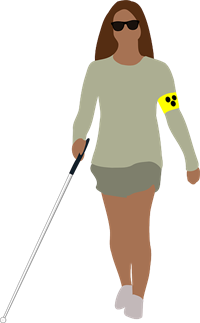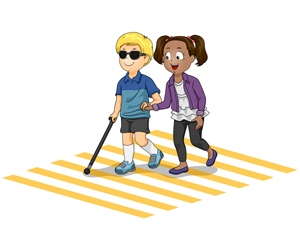PDF chapter test TRY NOW
“This is a very important part of our system. To make our children appreciate and understand misfortune, we make them share in misfortune too. Each term every child has one blind day, one lame day, one deaf day, one injured day and one dumb day. During the blind day their eyes are bandaged absolutely and they are on their honour not to peep. The bandage is put on overnight so they wake blind. This means that they need help with everything. Other children are given the duty of helping them and leading them about. They all learn so much this way — both the blind and the helpers.
Explanation:
In this paragraph, Miss Beam continues to explain about the unique system followed by the school. The main aim of the school is to make the students kinder and more responsible.

A thoughtful boy helping a physically challenged boy
The students learn to understand and appreciate the difficulties of other people. The school makes them share the misfortunes of the less fortunate people.
Each term has five different kinds of days. They are bind day, lame day, deaf day, injured day, and dumb day. During such days, the students will experience these disabilities one by one.
For instance, during the blind day, students understand the problems of a blind person. This is made possible by covering their eyes with a bandage. On the previous night of the blind day, the eyes of the students are covered using a bandage. This ensures that they wake up like a blind person. They spend their entire day in the shoes of a blind person. They would need help with almost everything. This makes them aware of the situation of the visually challenged.

A blind person
On the other hand, the students who are on their normal days are given the duty of helping them. They take care of the "disabled" students' needs. For instance, the helpers lead the blind-day students around like the boy from the first paragraph.
On the other hand, the students who are on their normal days are given the duty of helping them. They take care of the "disabled" students' needs. For instance, the helpers lead the blind-day students around like the boy from the first paragraph.

The helpers look after the blind-day students
This system helps the students learn a lot. Both the person with the disability and the helpers are benefitted from this system.
This system helps the students learn a lot. Both the person with the disability and the helpers are benefitted from this system.
Meanings of difficult words:
Sl. No. | Words | Meanings |
1 | System | A set of principles or procedures; arrangement; structure |
2 | Appreciate | Recognise the full worth of it |
3 | Misfortune | Problem |
4 | Deaf | Someone who lacks the power of hearing |
5 | Injured | Wounded; physically hurt |
6 | Dumb | Someone who cannot speak; mute |
7 | Eyes are bandaged | They are blindfolded |
8 | Absolutely | Totally; completely |
9 | Are on their honour | Have promised; with sincerity |
10 | Peep | Looking secretively through a narrow gap |
11 | Overnight | During the night |
Reference:
National Council of Educational Research and Training (2006). Honeysuckle. A Different Kind of School - E. V. Lucas (pp. 56-62). Published at the Publication Division by the Secretary, National Council of Educational Research and Training, Sri Aurobindo Marg, New Delhi.
